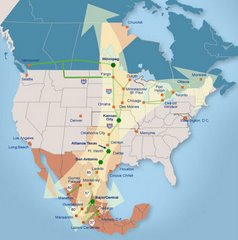The Senate, with just two weeks left in the session, has come to a big fat standstill. The reason: negotiations over SB 792, the newly crowned Big Transportation Bill.
Supporters of Gov. Rick Perry’s preferred toll road bill want it out of the Senate today. That would get it to third reading on House floor by Thursday, the scenario goes, in time to avoid a gubernatorial veto Friday of HB 1892, its older brother that Perry doesn’t like.
But the key senators on the bill, Tommy Williams of Houston and John Carona of Dallas, have been mostly missing in action since the Senate convened at 11 a.m., along with Lt. Gov. David Dewhurst. In the hallway outside waits a clutch of increasingly hungry staff members and lobbyists who worked on the bill.
Inside the Senate, the rest of us wait.
** It allows private toll road contracts to last 50 years, instead of 40 years as in HB 1892, and up to 70 years under current law.
** It exempts some more roads from the two-year moratorium on private toll road contracts, including Texas 99 near Houston and I-69 south of Interstate 37. South Texans, believing Perry’s claim that HB 1892 would kill any chance for that road, demanded this.
** It changes language in HB 1892 that would have allowed the state to buy back a profitable toll road from a private company based primarily on what the company had invested in the road. Instead, the buyback amount would be based on original estimates of toll revenue for the life of the project. This would be higher price generally than under HB 1892, but lower than under current law for successful toll roads.
** It fixes a mistake in HB 1892 which would have directed all money from multi-billion concession payments for the Texas 121 tollway to Dallas. Under this bill, the money would be allocated to both the Dallas and Fort Worth areas.
** The Harris County Toll Road Authority, which under HB 1892 would have gotten right of way free from the state for some new tollways, will have to pay the state its the original cost to the state of getting the land. However, those payments will stay in the Houston area for other road projects.
** In a completely new section, all future toll road projects would undergo a “market valuation” by a third-party to determine what their value might be in up-front concession payments. Then the local toll road agency would have first shot at doing the project as long as it could raise that up-front money














No comments:
Post a Comment